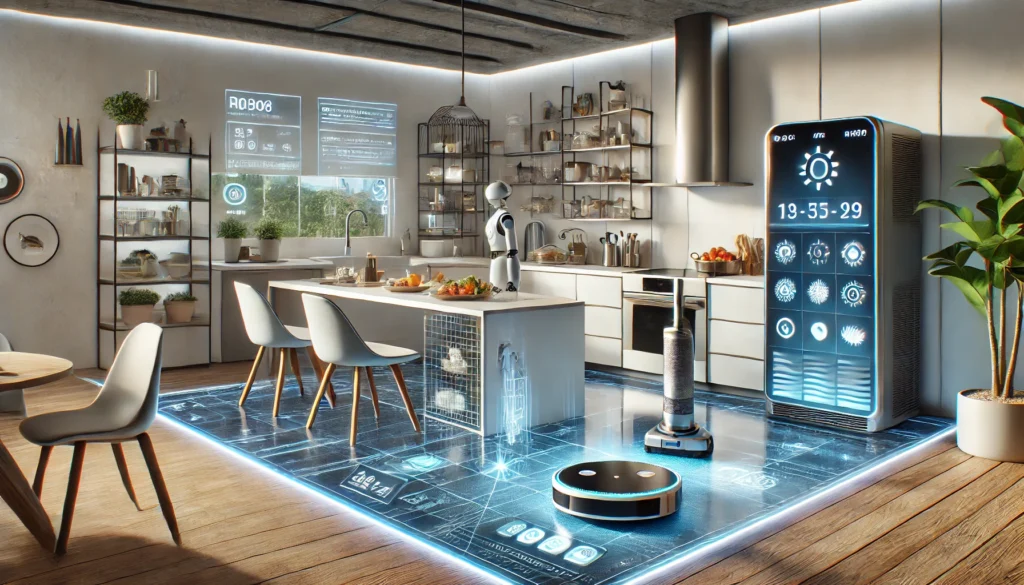
How AI is Revolutionizing Daily Life: From Chatbots to Smart Homes
Artificial Intelligence (AI) has seamlessly integrated into our daily lives, transforming how we interact with technology and our environment. From virtual assistants that manage our schedules to smart home devices that anticipate our needs, AI’s influence is profound and far-reaching.
1. Virtual Assistants and Chatbots
Virtual assistants like Siri, Alexa, and Google Assistant have become household staples, streamlining tasks through voice commands. These AI-driven assistants can set reminders, answer queries, control smart home devices, and even engage in casual conversation, enhancing user convenience. (Source)
Chatbots, employed by businesses across various sectors, provide instant customer support, process orders, and offer personalized recommendations. Their ability to handle multiple interactions simultaneously improves efficiency and customer satisfaction. (Source)
Chatbots are also being used in healthcare for scheduling appointments and providing mental health support. Platforms like Woebot and Replika use AI to interact empathetically, helping users manage stress and anxiety. This growing trend highlights how chatbots are evolving to meet complex human needs beyond just transactional tasks.
2. Smart Homes
AI has been instrumental in advancing smart home technology, creating environments that learn and adapt to residents’ behaviors. Devices such as thermostats, lighting systems, and security cameras now utilize AI to optimize energy consumption, enhance security, and improve overall comfort. (Source)
For instance, AI-powered smart mirrors can conduct comprehensive health scans and serve as telehealth platforms, reflecting the convergence of AI and healthcare within the home. (Source)
Moreover, AI systems like robot vacuum cleaners and automated lawn mowers save homeowners hours of manual labor. Smart refrigerators are capable of tracking food inventory, suggesting recipes, and even ordering groceries online. These innovations showcase how AI reduces the burden of daily chores while enhancing lifestyle quality.
3. Personalized Recommendations
AI algorithms analyze user behavior to provide personalized content across various platforms. Streaming services suggest movies or music based on past preferences, while e-commerce sites recommend products tailored to individual tastes. This personalization enhances user experience and engagement. (Source)
Beyond entertainment and shopping, AI’s recommendation systems are becoming essential in education. Platforms like Khan Academy use AI to suggest customized study paths for students, addressing their unique learning gaps. Similarly, fitness apps such as MyFitnessPal provide tailored workout routines and meal plans to users, ensuring a highly individualized experience.
4. Healthcare
In healthcare, AI assists in diagnostics, treatment planning, and patient monitoring. Wearable devices equipped with AI track vital signs and alert users to potential health issues, promoting proactive healthcare management. (Source)
AI is also used in medical imaging, where it identifies abnormalities in scans with high accuracy. Hospitals are adopting AI-driven systems for patient data analysis, enabling doctors to make more informed decisions. Telemedicine has seen significant growth, with AI-powered platforms facilitating virtual consultations, medication reminders, and follow-up care.
5. Transportation
AI enhances transportation through navigation apps that provide real-time traffic updates and optimal routing. Ride-sharing services utilize AI to match passengers with drivers efficiently, reducing wait times and improving service quality. (Source)
Self-driving cars represent a groundbreaking application of AI in transportation. Companies like Tesla and Waymo are developing autonomous vehicles capable of navigating complex environments with minimal human intervention. AI-powered traffic management systems are also being introduced in smart cities to minimize congestion and reduce commute times.
6. Education
Educational platforms leverage AI to offer personalized learning experiences, adapting content to suit individual student needs. This approach facilitates more effective learning and helps address diverse educational requirements. (Source)
AI is also improving accessibility in education by providing tools for students with disabilities. Speech-to-text applications and AI-driven sign language interpreters ensure inclusivity in classrooms. Additionally, AI enables educators to analyze student performance data, identifying areas where intervention is needed.
7. Security and Surveillance
AI-driven security systems provide enhanced surveillance capabilities, including facial recognition and anomaly detection, contributing to improved safety in both public and private spaces. (Source)
AI is increasingly used in cybersecurity to detect and neutralize threats in real-time. Machine learning algorithms analyze patterns of network activity to identify potential cyberattacks, helping organizations safeguard sensitive information. Smart locks and biometric authentication systems further bolster physical security.
8. Entertainment
In the entertainment industry, AI generates content, designs video game levels, and even composes music, showcasing its creative potential and expanding the boundaries of artistic expression. (Source)
AI is also enhancing viewer experiences through immersive technologies like virtual and augmented reality. For example, AI enables real-time rendering of complex graphics in gaming, creating lifelike environments. Film studios use AI for tasks such as script analysis, casting suggestions, and even editing, speeding up production timelines.
9. Daily Conveniences
AI simplifies daily tasks through features like autocorrect in text editing, spam filtering in emails, and predictive text, enhancing communication efficiency. (Source)
Voice recognition technologies have revolutionized accessibility for individuals with disabilities, enabling hands-free navigation of devices. AI-enhanced apps also assist in language translation, breaking down communication barriers in real-time. These tools demonstrate how AI empowers users to accomplish tasks effortlessly.
10. Future Prospects
The future holds exciting prospects for AI integration into daily life. Developments such as AI-powered robots designed to assist with household chores and provide companionship are on the horizon, indicating a trend towards more immersive AI experiences. (Source)
AI in wearable technology is expected to reach new heights, with innovations like mood-detecting devices and health-monitoring patches. Autonomous drones may soon handle package deliveries, emergency responses, and agricultural monitoring, expanding the scope of AI’s real-world applications.
In conclusion, AI’s pervasive presence continues to revolutionize various facets of daily life, offering convenience, personalization, and efficiency. As technology advances, the symbiosis between humans and AI is set to deepen, further enhancing our interaction with the world around us.